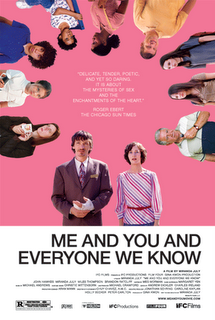Me and You and Everyone We Know
 "Back and forth. Forever." In one of the more idiosyncratic films I've seen of late, actress/director Miranda July creates a space so real its painful. The DVD box summarizes the film as such: "Christine Jesperson (Miranda July) is a struggling artist and senior cab driver who uses her talents and imagination to draw her dreams and objects of desire nearer. One such object is Richard Swersey (John Hawkes), a newly-single father of two precocious boys who is hoping for amazing things, yet panics upon meeting the captivating Christine. But in a world where the mundane is transcendent and people seek meaningful connections despite the risk, anything magical can - and will - happen."
"Back and forth. Forever." In one of the more idiosyncratic films I've seen of late, actress/director Miranda July creates a space so real its painful. The DVD box summarizes the film as such: "Christine Jesperson (Miranda July) is a struggling artist and senior cab driver who uses her talents and imagination to draw her dreams and objects of desire nearer. One such object is Richard Swersey (John Hawkes), a newly-single father of two precocious boys who is hoping for amazing things, yet panics upon meeting the captivating Christine. But in a world where the mundane is transcendent and people seek meaningful connections despite the risk, anything magical can - and will - happen."There are several notable scenes that convey the sheer humanity of the film with a grace unseen in many Hollywood films. For me, one of the most affecting moments occurs near the beginning of the picture when an outside character places a goldfish, in a water bag, on his roof of his car after purchasing it at the pet store. He forgets to retrieve the bag before closing his door and starting off down the highway. Christine and one of her senior passengers notice the fish, and in a moment of tenderness, offer kind blessings in what we know will be its last moments of life. Several other such moments occur interspersed throughout the film, but not with nearly as much emotional sensitivity or impact.
Perhaps the most "intriguing" scenes are those that helped the movie earn an R rating for a category I had not yet seen before: "Disturbing sexual content involving children." It sounds worse than it is. Basically, these scenes are further illustration of the film's overaching theme of the lengths that people will go to in order to be recognized by others - especially a potential love interest - in the hope of truly connecting with someone on a significant, transcendental level. The most "disturbing" factor of these scenes may simply be that our world alienates children to such an extent that they too are left searching for compassion long before they even realize what these abstract concepts mean to the greater welfare of their adult lives. Simply put, we are all lost in this great big world - we are all looking for someone who is looking for us. Sadly, children feel this loneliness too, and are uncertain how to reconcile this experience.
Roger Ebert wrote a glowing review that all but begs one not to miss this film. I agree that the child actors save the film. It's an important statement, if not universal enough for my taste.
3 out of 5 stars.



0 Comments:
Post a Comment
<< Home